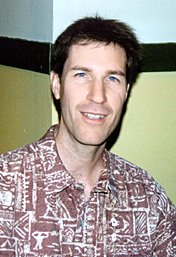| |
|
Mark Budz: The Trickle-Down Effect
Mark Budz was born in Cherry Hills, New Jersey. Because his father worked for the Park Service, they moved often, spending time in Virginia, Arizona, California, and finally Denver, where Budz attended high school. He went to college at the University of Colorado, graduating in 1982 with a BS in architectural engineering. He worked at a manufacturer's representative for ITT Bell & Gossett for three and a half years before getting laid off, which he took as an opportunity to write full-time. He moved to Eugene, Oregon, joined a writing workshop, and after a couple of years started working for specialty publisher Pulphouse. While in Eugene he met his wife, author Marina Fitch, and they moved to Watsonville, California, where he found work as a technical writer.
His first story, "The War Inside", sold to Pulphouse in 1991, followed by second-place Writers of the Future winner "Pale Marionettes" (1992) and more sales to Amazing Stories and F&SF. After writing half a dozen novels -- thrillers and SF -- he sold his first novel, futuristic eco-thriller Clade, in 2003; it was a finalist for the Phillip K. Dick Award. A sequel, Crache, appeared in 2004, and third novel Idolon is forthcoming.
|

Photo by Charles N. Brown
MarkBudz.com
|
|
|
Excerpts from the interview:
“Five years ago, I thought I would never sell a book. I'd written at least three science fiction novels and three thrillers before I sold Clade. I learned a lot from those books, most notably what not to do. I think the problem with those books is that they were too derivative. The best writing advice I ever got came from a statement made by Bruce Sterling: 'Follow your weird.' Just do your thing -- don't worry about what anybody else thinks. That's what I'm trying to do. It might also be part of the reason I take a break from science fiction every now and then and dip into the mainstream for a while. I look to cross-pollination from other genres for fresh input and ideas. Still, it’s important to read critically within the field, not only to keep up, but to stay in touch with the core dialog that science fiction has with itself and the world.”
*
 “In my first novel Clade, the nanotechnological aspect was used to explore a lot of social issues (and personal ones as well), in the sense that institutions and people's attitudes could also be manipulated or regulated in physical ways. Right now you have economic, ethnic, and racial differences, but that's learned behavior for many people. The book grew out of a sort of classic 'What if?' question: 'What if these prejudices, behaviors, or what have you could be physically manipulated or controlled through the use of technology -- nanotech (or biotech)?'
“In my first novel Clade, the nanotechnological aspect was used to explore a lot of social issues (and personal ones as well), in the sense that institutions and people's attitudes could also be manipulated or regulated in physical ways. Right now you have economic, ethnic, and racial differences, but that's learned behavior for many people. The book grew out of a sort of classic 'What if?' question: 'What if these prejudices, behaviors, or what have you could be physically manipulated or controlled through the use of technology -- nanotech (or biotech)?'
"That idea came out of a synthesis of things. Standing in the kitchen one morning, watching a trail of ants on the counter top exchange information through touch, I started thinking, 'What if people were able to do the same thing, communicate chemically rather than just verbally?' Another thing I was thinking about when I wrote Clade was the statistical projection that in 30 to 40 years the demographics of the United States are going to change. White middle class Americans are going to be a minority, and over 50% of the population are going to be people of color. I don't know what's going to happen as the demographics change, but it won't be 'white men in space' anymore! Living in Watsonville also factored into that idea. It's an ethnically diverse city, with a lot of Hispanic migrant workers. In grocery stores, I’d sometimes find myself standing in the aisle and all the people around me would be speaking Spanish. I could just as easily be in Mexico City! Watsonville essentially had two different communities of people that occupied the same space yet didn't interact except on the most cursory level. That gave me the idea for the clades. In Clade these divisions are biochemically enforced, and even people's ability to survive in some environments depends on certain artificial chemicals.”
*
“I go into a book thinking I know what it's about, and inevitably it changes: the outline breaks down partway through, based on what I've done so far. Things always end up more complicated and messy than I’d planned. That's already happening in Idolon, which deals with the blurring of identity and the line between reality and virtual reality ('virtuality'). In a world where all matter is programmable and digital, there's no analog left; in that sense it becomes virtual. Maybe quantum mechanics is the best metaphor for describing the world. Everything's uncertain, and reality exists inside our heads. History's a mental construct. Certainly a lot of science fiction exists in its own space or thought experiment. It doesn't matter that most science-fictional worlds haven't come true. They're a place where you can at least think about things: that's what's important. One thing science fiction can do that mainstream can't is provide a space where you can make any future -- and therefore the future -- real.”
|
|


